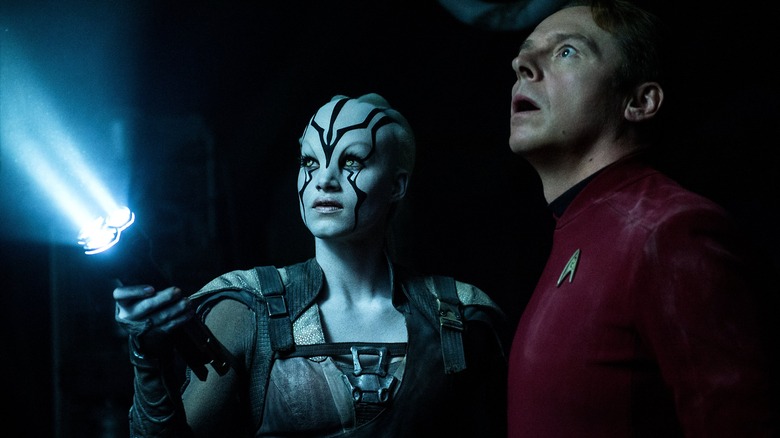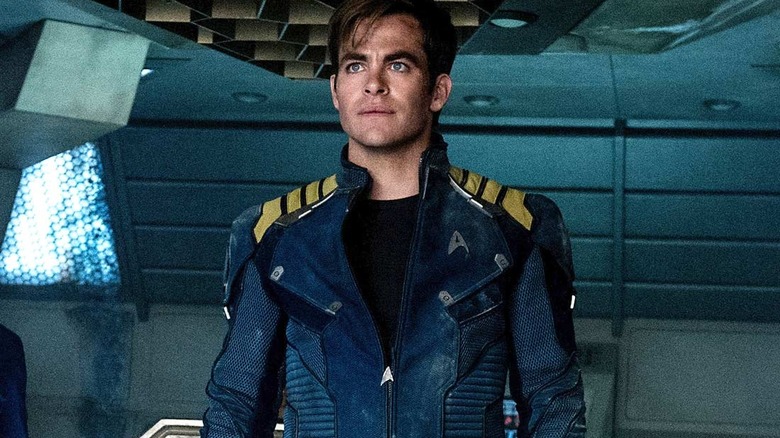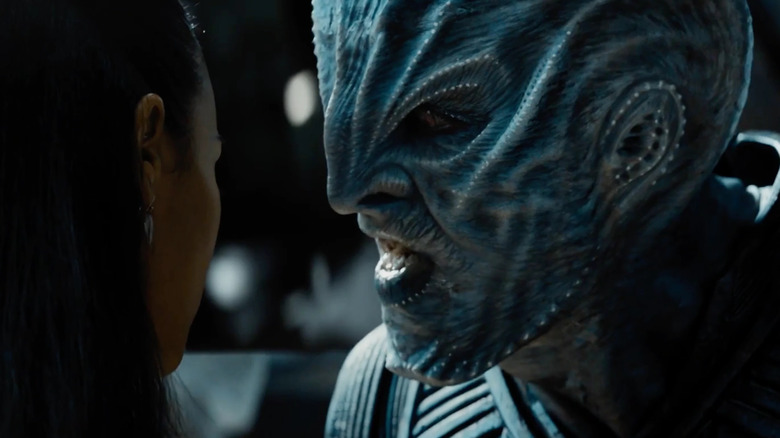Justin Lin's First Idea For Star Trek Beyond Nearly Sent Simon Pegg Packing
Fun trivia. In the "Star Trek" movies alone, an iteration of the U.S.S. Enterprise has been destroyed three times. In "Star Trek III: The Search for Spock," Kirk (William Shatner) blows up the ship to prevent Klingons from gaining control. In "Star Trek: Generations," the Duras Sisters damage the Enterprise-D so badly, a portion of it needs to crash land on Veridian III. And in "Star Trek Beyond," drones controlled by the resentful Krall (Idris Elba) destroy the Enterprise at the end of the film's first act. That may seem like a lot of "Enterprise" destructions, but it's not as many as in the "Next Generation" episode "Cause and Effect," wherein audiences saw the Enterprise-D explode four times.
It was the destruction in "Star Trek Beyond" that caused some controversy among the filmmakers. Justin Lin, the director of "Better Luck Tomorrow" and five of the "Fast & Furious" movies helmed "Beyond," and he sought to make his "Trek" a careful balance between high-octane action and character-based problem-solving. The plot of "Beyond" saw the main characters separated on a distant planet after the destruction of their ship, and they had to use their wits and skills to reunite and stop Krall from enacting a revenge plot against the Federation. It also featured a scene of Kirk (Chris Pine) on a motorcycle and the use of the Beastie Boys' "Sabotage" as a weapon against the drones.
The idea to blow up the Enterprise in the first third of "Beyond" was Lin's idea, and it was an idea that most certainly didn't fly with screenwriter Simon Pegg. Explode the ship? Absurd! Pegg and Lin recalled their somewhat embittered brainstorming sessions while developing "Beyond" together in a 2016 interview with the Verge. It seems their first 16 hours together were completely unproductive.
'You can't destroy the Enterprise!'
Evidently, the first meeting between Simon Pegg and Justin Lin was tempestuous at best. Lin felt that the "Star Trek" movies needed to be a little more daring than they had been, and that some lines needed to be crossed. Pegg, an outspoken pop culture nerd, was still keen on keeping the spirit of "Star Trek" alive. Lin recalled the initial outrage he encountered when he pitched his plot idea, and the fear that the film may not happen:
"Simon was like, 'You can't destroy the Enterprise and you can't do it in the end of the first act. It has to be the end of the movie!' [...] That was our first meeting. We walked out and I think all of us were like, 'I don't want to work on this movie. What's going on?'"
Pegg, likewise, admitted that their first meeting wasn't entirely copacetic and that hours and hours passed without a compromise. The screenwriter said:
"We call it The Longest Day. [...] We were in this room at the SoHo Hotel, just talking for 16 hours and we didn't seem to be getting anywhere. But it was a great way to establish that all of us really wanted to make the best film we could."
That's a diplomatic way to say that it was a frustrating and unproductive day. Luckily, they soon found some equal footing and began to slowly extrude workable ideas out of their collaboration. Ultimately, the director and the writer found common ground in their mutual outrage over what was happening politically in the real world. They admitted that their film isn't a direct metaphor for the rise of the Extreme Right in both England and America in 2016, but it did serve as inspiration.
Is Krall a metaphor for Brexit?
Some spoilers ahead.
The villain of "Beyond" seems to be a wicked alien named Krall who seeks to destroy the Federation for unknown reasons. It is later revealed that he was once a human named Captain Balthazar Edison who had been transformed into a long-lived alien a century ago. Krall/Edison was a captain long before the Federation was formed, and resented that the organization was attempting to reach out to its enemies like the Xindi. That sort of resentment and anti-diplomacy thinking was falling in with a trend of isolationism around the globe, and Simon Pegg wanted to tap into that. The screenwriter noted:
"It was all bubbling up then, with the Scottish referendum and various acts of separatism around the world. [...] Trump talking about building a wall between here and Mexico. This sort of rampant xenophobia that seemed to be reestablishing itself. [...] We liked the idea of old god versus new. Of narrow-minded thinking, or fear of collectivism, versus the Federation model, which is to embrace and expand in a non-aggressive way. That seemed like the obvious thing to do for this 50th anniversary iteration of the story."
"Star Trek Beyond" does contain anti-isolationist themes in a world that is apparently giving away to authoritarian rule, xenophobia, and intimidation. In that regard, the film was timely. Justin Lin and Pegg ultimately made a film that was an action and adventure picture first and foremost, but they put some thought into their premise as well.
It's also interesting that they should make so many references to "Star Trek: Enterprise," what with the talk of the Xindi and Krall's human uniforms. "Beyond" more or less brought the Kelvin-verse to a close. A fourth film is still in development hell.


